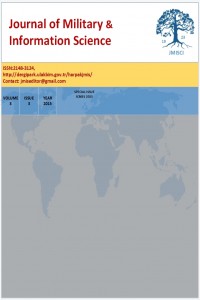Abstract
Intelligence cycle is a systematic process which is usually applied in order to obtain intelligence from raw data. Today the world has been experiencing dazzling changes on many fields as well as technology. With the help of the new emerging technologies the data that have to be handled for intelligence is much more than ever. In addition to new technological contributions, there are discussions about intelligence cycle whether it’s being out-dated and old fashioned. Intelligence cycle was mainly prepared due Soviet threat. After the collapse of Soviet Union, concept of security has shifted drastically. And consequently, people have started to question its validity. The biggest question is about the intelligence cycle model. Does the process meet today’s needs? If not so what should be done in order to attain more effective intelligence? Therefore, this paper deals with the knowledge hierarchy and intelligence cycle with view to state viability of intelligence cycle in today’s condition and moreover examines new approaches to intelligence development process.
References
- Ackoff, R.L. (1989). From Data to Wisdom. Journal of Applied System Analysis, 16: 3–9.
- Albus, J. S. (1991). Outline for a Theory of Intelligence. IEEE Transactions on Systems, Man, and Cybernetics, 21: 473–509.
- Başaran, C. (2014). A Short Review on Integrated C2 Systems. Journal of Military and Information Science, 2(3), 77-83.
- Bennet, A., & Bennet, D. (2004). Organizational Survival in the New World: The Intelligent Complex Adaptive System, Butterworth: KMCI Press.
- Cleveland, H. (1982). Information as Resource. The Futurist: 37–39.
- Duvenage, M.A. (2010). Intelligence Analysis in the Knowledge Age. Stellenbosch University.
- Goztepe, K. Kahraman C. (2015) A New Approach to Military Decision Making Process: Suggestions from MCDM Point of View, International Conference on Military and Security Studies, 118-122, Istanbul
- Heibel, B. (2012). Should We Kill the Intelligence Cycle ?. Foreknowledge, (June): 8.
- Sternberg, R. J. (2011). What Is the Common Thread of Creativity? Its Dialectical Relation to Intelligence and Wisdom. American Psychologist, 4(56): 360–63.
- Treverton, G. (2001). Reshaping National Intelligence in an Age of Information, New York: Cambridge University Press.
- Water, L. (2000). Knowledge Is Like Light – Information Is Like Water. Information Development, 16(4): 233-238.
- Hey, J. (2004). The Data, Information, Knowledge, Wisdom Chain: The Metaphorical Link. Unpublished
- Hulnick, A.S. (2006). What’s Wrong with the Intelligence Cycle. Intelligence and National Security, 21(6): 963–65.
- “Intelligence Cycle.” http://www.fbi.gov/ about-us/ intelligence/intelligence-cycle. (Accessed: 20-November-2015).
- Karabekir, K. (1998). Gizli Harp-İstihbarat. İstanbul.
- Lowenthal, M.M. (2000). Intelligence: From Secrets to Policy. Washington: CQ Press.
- Manuscript.http://www.dataschemata.com/uploads/7/4/8/7/7487334/dikwchain.pdf. (Accessed: 20-November-2015).
- Nakamori, Y. (2003). Systems Methodology and Mathematical Models for Knowledge Management. Journal of Systems Science and Systems Engineering, 12(1): 49–72.
- Polanyi, M. (1958). Personel Knowledge : Towards a Post Critical Philosophy. London: Routledge.
- Pre Doctrinal Handbook. (2010). NATO Publication.
- Bi-Strategic Command Knowledge Development
- Rathmell, A. (2002). Towards Post Modern Intelligence. National Security, 17(3): 87–104.
Abstract
References
- Ackoff, R.L. (1989). From Data to Wisdom. Journal of Applied System Analysis, 16: 3–9.
- Albus, J. S. (1991). Outline for a Theory of Intelligence. IEEE Transactions on Systems, Man, and Cybernetics, 21: 473–509.
- Başaran, C. (2014). A Short Review on Integrated C2 Systems. Journal of Military and Information Science, 2(3), 77-83.
- Bennet, A., & Bennet, D. (2004). Organizational Survival in the New World: The Intelligent Complex Adaptive System, Butterworth: KMCI Press.
- Cleveland, H. (1982). Information as Resource. The Futurist: 37–39.
- Duvenage, M.A. (2010). Intelligence Analysis in the Knowledge Age. Stellenbosch University.
- Goztepe, K. Kahraman C. (2015) A New Approach to Military Decision Making Process: Suggestions from MCDM Point of View, International Conference on Military and Security Studies, 118-122, Istanbul
- Heibel, B. (2012). Should We Kill the Intelligence Cycle ?. Foreknowledge, (June): 8.
- Sternberg, R. J. (2011). What Is the Common Thread of Creativity? Its Dialectical Relation to Intelligence and Wisdom. American Psychologist, 4(56): 360–63.
- Treverton, G. (2001). Reshaping National Intelligence in an Age of Information, New York: Cambridge University Press.
- Water, L. (2000). Knowledge Is Like Light – Information Is Like Water. Information Development, 16(4): 233-238.
- Hey, J. (2004). The Data, Information, Knowledge, Wisdom Chain: The Metaphorical Link. Unpublished
- Hulnick, A.S. (2006). What’s Wrong with the Intelligence Cycle. Intelligence and National Security, 21(6): 963–65.
- “Intelligence Cycle.” http://www.fbi.gov/ about-us/ intelligence/intelligence-cycle. (Accessed: 20-November-2015).
- Karabekir, K. (1998). Gizli Harp-İstihbarat. İstanbul.
- Lowenthal, M.M. (2000). Intelligence: From Secrets to Policy. Washington: CQ Press.
- Manuscript.http://www.dataschemata.com/uploads/7/4/8/7/7487334/dikwchain.pdf. (Accessed: 20-November-2015).
- Nakamori, Y. (2003). Systems Methodology and Mathematical Models for Knowledge Management. Journal of Systems Science and Systems Engineering, 12(1): 49–72.
- Polanyi, M. (1958). Personel Knowledge : Towards a Post Critical Philosophy. London: Routledge.
- Pre Doctrinal Handbook. (2010). NATO Publication.
- Bi-Strategic Command Knowledge Development
- Rathmell, A. (2002). Towards Post Modern Intelligence. National Security, 17(3): 87–104.
Details
| Primary Language | English |
|---|---|
| Journal Section | Reports |
| Authors | |
| Publication Date | May 4, 2015 |
| Published in Issue | Year 2015 Volume: 3 Issue: 3 |


